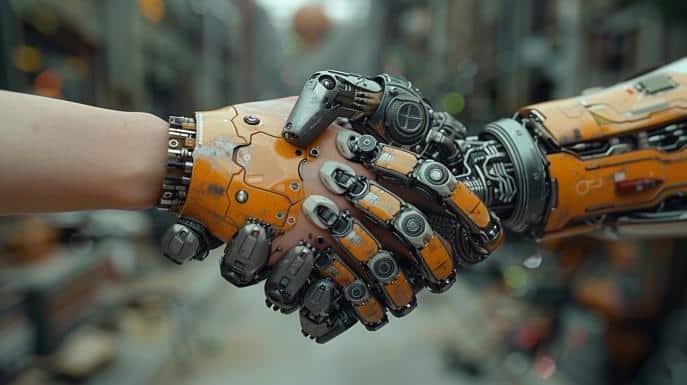Have you ever stopped to think about how Artificial Intelligence (AI) is the silent engine behind a productive day? Our daily lives are constantly evolving, and the title “Artificial Intelligence speeds up daily tasks” is a promise of efficiency at our fingertips. From small tasks to complex decisions, follow with us which AI applications are already part of your routine, without you realizing it. From virtual assistants that organize our schedules to systems that optimize our choices — get ready to discover how AI is shaping our daily lives in revolutionary ways.
How is Artificial Intelligence changing our daily activities?
What are the common AI applications we use every day?
Everyday AI applications include voice assistants like Alexa and Siri, recommendation systems like those used by Netflix and Spotify, and camera apps that identify faces and optimize settings for photos. Virtual assistants, an integral part of many of these applications, make it easier to organize schedules, send reminders and optimize tasks.
With the rise of virtual assistants, tasks such as scheduling meetings, searching for information on the internet or even controlling home devices become more efficient. AI stands out for its ability to learn from past interactions, which allows for an increasingly personalized experience. Have you ever stopped to think about how these technologies are rooted in our routines?
How have virtual assistants made routines easier with AI?
Modern life demands agility and practicality. Virtual assistants and AI not only respond to commands but also anticipate needs and learn behavior patterns to offer increasingly accurate solutions, improving time management and comfort in everyday life.
In healthcare, AI contributes significantly to more assertive diagnoses and personalized treatments, in addition to predictive analysis of diseases that can result in cost reduction and improved patient care. At home automation, smart devices save energy and optimize home management, enabling voice control and task automation.
In transportation, autonomous vehicles promise to reduce accidents and revolutionize logistics. And the financial sector uses AI in services such as robo-advisors, fraud detection and sophisticated algorithmic trading.
However, ethical issues regarding privacy, security and social impact of decisions made by machines are on the agenda. There is a risk that such technologies will increase social disparities if access to their benefits is not equitable. AI ethics proposes a regulatory framework to ensure that AI systems are responsible, fair and non-discriminatory.
However, AI also brings an immense opportunity for inclusive growth. In education, it favors personalized learning experiences, being able to close educational gaps and make knowledge more accessible.
Artificial intelligence is reconfiguring work landscapes, driving the need to adapt the workforce through reskilling and upskilling. The future of AI integration into society will require careful consideration within legal and international governance structures to control its application and prevent potential harm.
What are the recent AI advances in smart home automation?
Artificial intelligence (AI) has been changing the landscape of smart home automation in ways previously only imagined in science fiction films. Today, thanks to advances in this technology, our homes are becoming truly “smart”.
How is AI making our homes smarter?
AI has introduced a level of automation and personalization that significantly elevates the user experience. It allows devices such as thermostats, lamps and security systems to learn and adapt to residents' habits, optimizing energy use and providing greater comfort and safety. The active voice in command of these devices, through virtual assistants, is one of the most striking features of this advancement. With the implementation of the systems presented in Techlise, it is clear that AI not only performs tasks, but also thinks of ways to improve them.
How is AI in wearable devices improving well-being?
The AI revolution is not just restricted to our homes. It extends to wearable devices, monitoring and improving our health and well-being. These devices collect data on physical activity, sleep patterns and even vital signs, providing detailed information and personalized recommendations. This makes it easier to identify potential health problems before they become serious and allows for more accurate monitoring of chronic diseases.
AI transforms every aspect of living, from simplifying household tasks to providing deep insights into the state of our health, guiding us towards a daily life that is not only more efficient, but also more harmonious with our well-being. These advancements are just the beginning, as AI expands its ability to learn and interact with the world in more sophisticated ways. The promise is of homes that not only respond to our commands, but anticipate our needs, and of holistic health increasingly supported by technological precision and predictability.
What impact does AI have on medicine and public health?
Artificial intelligence (AI) has played an essential role in transforming medicine and public health. In medicine, AI is helping with more accurate diagnoses through advanced processing of large data sets and medical images, which enables the early identification of potentially serious diseases. Examples of this include algorithms that detect patterns in CT scans and mammograms, enabling more accurate diagnoses of cancer, for example.
The accuracy of the diagnoses offered by AI is due to its ability to learn from a vast number of cases, often surpassing the ability of the human eye to detect subtleties in medical images. The use of algorithms can, therefore, reduce error rates and, consequently, increase the chances of successful treatments through early interventions.
To the same extent, the AI contributes to advanced treatments and healthcare. This is happening through the personalization of pharmacological therapies based on a patient's genetics and clinical history, and also through continuous monitoring of health status through smart medical devices. These advances are allowing healthcare professionals to offer more individualized and assertive care, increasing the chances of recovery and improving the patient's quality of life.
Within public health, AI has the potential to improve the efficiency of systems, optimize resource management, and contribute to a more agile response to epidemics, through predictive analysis. On a macro scale, AI can be a vital tool in monitoring population health, helping to make informed decisions that can save lives and prevent health crises.
This technology also provides doctors and researchers with deeper insights into disease patterns, their progressions and possible treatments. Furthermore, AI is a key element in the research and development of new drugs, reducing the time and cost associated with the discovery process.
Despite these promising advances, there are still significant ethical and regulatory challenges that need to be overcome, such as equitable access to the benefits brought by AI and the protection of sensitive data. However, the positive impacts on medicine and public health are already a reality, and the trend is a continuous increase in its adoption for more efficient and personalized health management.
AI and mobility: How will autonomous cars transform our future?
What is the current progress on AI-driven self-driving cars? Currently, autonomous cars have evolved significantly thanks to Artificial Intelligence (AI). These vehicles are equipped with systems that allow them to perceive the environment, make decisions with little or no human intervention, and travel safely and efficiently. The biggest technology and automotive companies are constantly improving computer vision, data processing and machine learning algorithms to improve vehicles' response to varied and unexpected stimuli.
The role of AI in optimizing routes and logistics is invaluable. Intelligent systems analyze a large volume of data to define faster and safer routes, considering variables such as traffic, weather conditions and obstacles on the route. This ability to analyze and adapt is crucial not only for the individual experience of drivers and passengers, but also for optimizing cargo transport, which could revolutionize logistics and the delivery sector.
By means of advanced technologies, autonomous cars have the potential to reduce accidents caused by human errors and improve urban mobility. As autonomous vehicles begin to become more common on the roads, it is already possible to envision a future in which this type of transport is integrated into daily mobility patterns, contributing to smarter and more sustainable cities.
Advances in AI not only promise transformations in the way we travel but also significantly affect the economy by reducing insurance and maintenance costs and optimizing the use of fuel. The effective implementation of autonomous cars could also mean profound changes in the professions linked to driving and in the infrastructure of cities. The possibilities are exciting and broad.
Therefore, while we celebrate the progress of autonomous cars, we reflect on the vital role of AI in this future scenario, capable of radically transforming our current concepts of transport and mobility. As AI advances, we begin to understand more not only about the potential of these technologies, but also about how to configure tomorrow to better take advantage of the benefits they have to offer, while meeting the ethical and social demands intrinsic to this development.
What ethical and social challenges does AI present?
On the journey of Artificial Intelligence (AI), we encounter profound issues that go beyond its technical potential. Ethical dilemmas and social implications emerge as we adopt this technology in all spheres of life. AI ethics is a field of study that seeks to align the development of this technology with universal moral values to ensure that it not only acts effectively, but also with fairness and integrity.
Experts agree that if AI is to be a force for good, we must commit to shaping its ethical development. O emergence of AI brought a spectrum of possible outcomes, from the incredibly beneficial to those that mirror dystopian fiction dilemmas. So how are AI ethics shaping its development? The answer lies in creating systems that are transparent, accountable and designed to ensure they do not reinforce prejudices or increase existing social disparities. This requires a robust understanding of ethical principles and the implementation of governance mechanisms that can harmonize innovation with ethics.
Another critical aspect is the potential of AI to exacerbate social inequality. Powerful algorithms have the ability to transform the economy, alter labor market dynamics, and reconfigure access to essential services. The crucial question is: can AI increase social inequality? The answer, unfortunately, is yes – if not managed carefully. AI systems can inadvertently – or even intentionally, when poorly designed – replicate and amplify biases, resulting in discriminatory outcomes in hiring, lending, and legal decisions.
How to prevent this is at the heart of the current debate surrounding the social impacts of AI. To avoid a widening of social inequality, policies and interventions must be created to ensure equitable access to the advances that AI offers. This involves commitment from all stakeholders – from policymakers to technology creators – to promote inclusive and sustainable practices, as well as investment in education and training to prepare the workforce for change. The key to successfully integrating AI into our social fabric lies in promoting inclusive growth and developing technologies that are, by default, ethical and fair.
We are done for today, however, the conversation about AI, ethics and society is just beginning. This is a dynamic field, which will require continuous reflection and constant adaptation to the innovations that will inevitably continue to shape our daily lives.
Artificial Intelligence speeds up daily tasks
Have you ever stopped to think about how AI applications have become fundamental in our daily lives? From small actions like ordering a pizza to the way we manage our finances, Artificial Intelligence is everywhere.
Virtual assistants are one of the most obvious examples that contribute immensely to making our routines easier. Have you ever experienced the satisfaction of having an organized to-do list or an important appointment reminder without having to touch a single button? Yes, this is possible thanks to AI.
The magic happens through algorithms that learn from your behavior patterns. By identifying your preferences and needs, AI can predict your future actions and help proactively. It's not just a matter of convenience, but a new way interacting with technology that is changing our relationship with the digital world.
What are the common AI applications we use every day?
From voice recognition on our smartphone to personalized product or content recommendations on streaming services, we often use Artificial Intelligence without even realizing it. Navigation apps that calculate the fastest route based on real-time traffic are a classic example. Financial tools that monitor our spending and help us create budgets also rely on AI's ability to process large volumes of data to provide accurate insights.
How have virtual assistants made routines easier with AI?
This question reminds me how much we depend on small voice commands to play a favorite song, set alarms or even make online purchases. Thanks to integration with other tools and devices, virtual assistants optimized by Artificial Intelligence can now control lights, adjust thermostats and even order a coffee from your favorite coffee shop – all without taking our eyes off our tasks.
Artificial Intelligence is the foundation that makes these experiences not only possible, but also efficient and personalized for each user. And as technology advances, we see a horizon where even more complex tasks will be simplified, elevating our productive and creative potential to hitherto unimaginable levels.
In this article, we navigate the waves of transformation that Artificial Intelligence (AI) has brought to our routine, from the simplification of daily tasks with apps and virtual assistants to the promises of autonomous cars. We cover how AI makes our homes smarter and our wearables more intuitive, thereby improving our well-being. Additionally, we analyze its revolutionary role in medicine and public health, offering more accurate diagnoses and advanced treatments. Finally, we reflect on the ethical and social challenges of this technology. The path to this point outlines a horizon where AI, used with awareness and responsibility, is a key part of pioneering a future where quality of life and innovation go hand in hand.
FAQ
Common questions:
What are the common AI applications we use in everyday life?
Common AI applications include voice assistants like Alexa and Siri, recommendation systems on platforms like Netflix and Spotify, and camera apps with facial recognition and automatic adjustments.
How has AI made our daily routines easier?
AI has facilitated daily routines by allowing virtual assistants to organize schedules, send reminders and optimize tasks, as well as learning from past interactions to offer an increasingly personalized experience.
What advances has AI provided in smart home automation?
In smart home automation, AI has enabled home devices like thermostats and security systems to learn from users' habits, save energy, and provide comfort and security through voice commands and personalization.
How is AI impacting the medical and public health sector?
AI is impacting medicine through more accurate diagnoses via machine learning and medical image analysis, as well as contributing to personalized treatments and continuous health monitoring with smart devices.
What ethical and social challenges do AI present?
AI brings ethical and social challenges, such as the need to create responsible and fair systems that do not reinforce prejudices or widen social disparities, requiring equitable access policies and careful consideration in legal and international governance.





